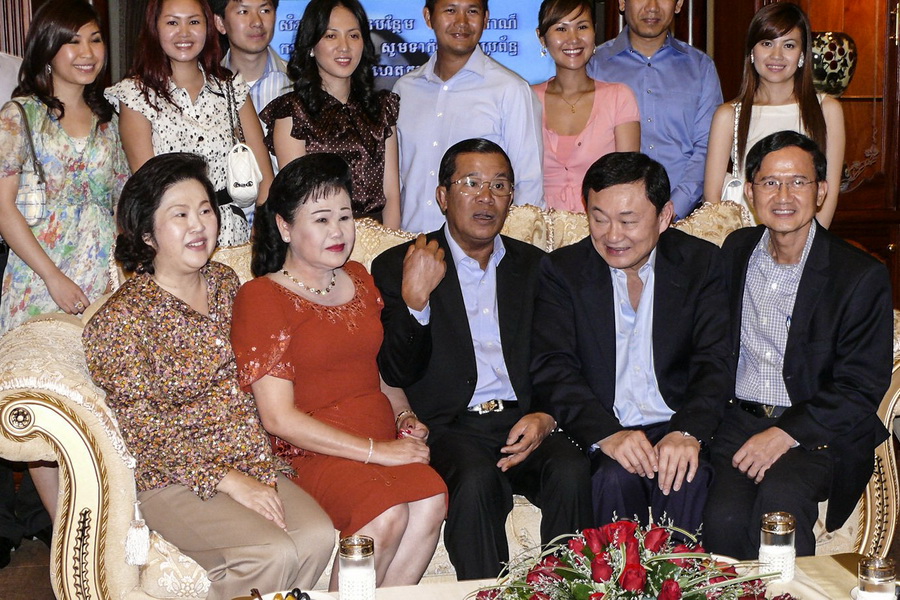The family of Cambodian dictator Hun Sen sits on at least $200 million. But it might not save them from populist anger.

Like the monsoons, repression in Cambodia comes on a regular schedule, and the current season looks like it will be an especially long and stormy one. On July 10, the tension reached a violent crescendo when Kem Ley, a prominent political commentator and advocate, was shot and killed in a brazen daylight attack at a gas station in Phnom Penh. Though police quickly arrested a man who confessed to shooting Kem Ley over a $3,000 debt, few doubt the killing was politically motivated — just one of a string of unsolved political murders that stretches back to the early 1990s.
Over the past 12 months, the government has jailed more than 20 people, including opposition parliamentarians, human rights activists, and land rights campaigners. Kem Sokha, the deputy president of the country’s main opposition party, the Cambodia National Rescue Party (CNRP), remains holed up in the party’s headquarters in Phnom Penh, Julian Assange-style, facing arrest in connection with an alleged affair with a hairdresser. His crime? Trumped-up charges of “procuring prostitution.” As of May 26, failure to show up to court has been added to the docket. Meanwhile, Sam Rainsy, the country’s perennial political gadfly, is stranded in self-exile overseas — his third enforced timeout in the past decade — facing arrest on a defamation conviction from 2011.
This is all straight out of the playbook of Cambodia’s prime minister, Hun Sen, one of the world’s longest-serving leaders. For nearly half his life, the 63-year-old has loomed over this small Southeast Asian nation of 15 million people, ruling through a carefully calibrated blend of force, guile, and legal manipulation. Crackdowns like the current one have alternated with periods of apparent calm and tolerance, often timed to national elections. And Hun Sen, as well as his ruling Cambodian People’s Party (CPP), always emerges on top — even when he doesn’t win the actual election.
But as opposition mounts ahead of local elections next June, and with crunch national polls scheduled for mid-2018, Hun Sen’s hold on power is appearing increasingly insecure. At the last national election in 2013, the CNRP scored large gains by tapping into concerns about the corruption, clotted institutions, and lack of economic opportunity that have marked the latter years of the Hun Sen era.
Indeed, after 37 years in power, the CPP has a lot to lose. In a report released on July 7, the London-based transparency group Global Witness argued that Hun Sen sits at the center of an economic empire that reaches into every corner of the country, what it described as a “huge network of secret deal-making, corruption and cronyism.”
According to the report, titled “Hostile Takeover” and based on public company records held by the Cambodian Ministry of Commerce, Hun Sen’s immediate family — including his wife, five children, children-in-law, and various nieces and nephews — has registered interests in 114 private domestic firms. These range from energy, petrol, and bottled water to advertising and media, with a total listed capital of just over $200 million — the first conclusive statistic to have been published on Hun Sen’s family wealth.
Patrick Alley, the co-founder of Global Witness, said this was most likely just the “tip of the iceberg,” given the dearth of official documentation. “There is very little transparency in Cambodia’s private sector and the majority of economic activities take place behind a wall of secrecy,” he said in an email. As for the full extent of the Hun family’s wealth, “experts estimate it as anything from half a billion USD up to as much as $4 billion, but nobody knows the real figure.” Phay Siphan, a spokesman for the Council of Ministers, as Cambodia’s cabinet is known, refused to comment on the specific allegations made by Global Witness. “This report is propaganda against the prime minister. We don’t care about these people,” he said.
For years, this off-the-books wealth has been crucial to Hun Sen’s hold on power, providing a wellspring of patronage that trickles downward, ensuring the loyalty of powerful tycoons, provincial power brokers, and key members of the military and police. In this system, companies owned by well-connected individuals are granted lucrative public contracts and concession licenses for land and natural resources like timber, allegedly kicking a share of the profits back to Hun Sen and the CPP.
The problem for Hun Sen, longtime Cambodia watchers say, is that true democratic reform risks undermining the economic base of his power.
But like the late Indonesian dictator Suharto, whose 31-year reign ended amid widespread rioting and public protests in May 1998, this cycle of patronage has created a social blowback that now threatens the CPP’s hold on power. Public anger about land grabs, deforestation, and low-level corruption — amplified by the canny use of social media — contributed to the CNRP’s large gains in the 2013 election. And while economic growth remains strong on paper (between 2004 and 2011, the number of Cambodians living under the poverty line fell from more than half the population to one in five, according to the World Bank, and GDP growth for 2015 was projected at 7 percent), large numbers remain vulnerable to small changes in economic fortune.
Demographics have compounded Hun Sen’s challenge. Increasing numbers of Cambodians are too young to remember the country’s cycle of civil wars, which ended in the late 1990s, and are thus less satisfied with the CPP’s claim — repeated constantly through the pliant Khmer-language press — that it brought peace and stability to a long-suffering land.
The problem for Hun Sen, longtime Cambodia watchers say, is that true democratic reform risks undermining the economic base of his power. Marcus Hardtke, a veteran environmental activist who has lived in Cambodia for 17 years, described the system as “a textbook organized crime cartel,” with Hun Sen in the role of godfather. “He has to feed the dogs,” Hardtke said. “If he’s not feeding them every month, they won’t be loyal anymore.”
The contradiction is evident in how Hun Sen has sought to win back lost support since 2013. Stung by his party’s poor showing in the polls, the prime minister has since adopted a dual-track strategy of wooing the electorate through populist reforms — wage hikes for teachers and soldiers, promises of land for poor farmers — while acting ruthlessly to quash any challenge to the patrimonial networks that sustain him. This strategy can be seen in the microcosm that is Hun Sen’s busy Facebook page, another post-2013 election innovation. His staff posts noodle stall photo-ops and avuncular family shots, alongside live-streamed speeches in which he threatens his opponents.
In the past, Hun Sen has usually eased off his opponents in order to placate the foreign governments that have bankrolled Cambodia’s reconstruction since the early 1990s. But as opposition mounts, there are signs that Hun Sen may be settling into a more permanent authoritarian groove. The prime minister has already warned Sam Rainsy, the president of the CNRP, that he shouldn’t expect to be allowed to return to Cambodia for the 2018 election, as he was allowed to in 2013. And the prime minister recently told Kem Sokha that he could remain under house arrest “forever” if Hun Sen wished it. “If you don’t go to prison, the prison will come to you,” he said in a barnstorming June 29 speech.
The July 10 assassination of Kem Ley, who had registered a new Grassroots Democracy Party to run in the 2017 commune elections, was a further dark throwback to the 1990s and early 2000s, when journalists, union leaders, and opposition members were frequently gunned down with impunity. In the days before his death, Kem Ley had commented publicly about the new report by Global Witness and criticized the use of the judiciary to attack the opposition.
But now, with increasing amounts of support from a rising China, which has poured billions of dollars in loans and investments into Cambodia over the past two decades, Hun Sen is less afraid of a serious backlash from Western donor governments. When the European Parliament passed a resolution in June calling for a suspension of EU development aid to Cambodia in response to the current clampdown, Hun Sen shrugged off the threat, praising Beijing for its no-strings support. In another June speech, he told foreign diplomats to keep their mouths shut, warning, in his characteristic third person, that “Hun Sen cannot be easily pressured.”
And so the long season of authoritarianism stretches on.
Even if Hun Sen comes out on top again, he won’t be able to avoid the question of how to reform a patronage-based political system that is in many ways unreformable. As Alley of Global Witness put it, increasing amounts of wealth are still required to “continuously reward the country’s elites who expect to be bestowed with ‘gifts’ in return for their unwavering support.”
And so the long season of authoritarianism stretches on. About a week before he was murdered in Phnom Penh, I called Kem Ley and asked him for a forecast of where he thought the country was headed. He said he saw little chance of an opposition victory like in Myanmar’s November election, where Aung San Suu Kyi’s National League for Democracy swept to a stunning victory. “No,” he said, “this will not be like Burma.”
But the contradiction underlying Hun Sen’s rule — the gap between the needs of the system and the needs of the Cambodian people — will have to be resolved. When I spoke with him, Kem Ley warned that if a politically awakened population can’t get solutions from its leaders, it might be tempted to seek solutions in the street. “If the party can’t change to respond to the needs of the people, the people will change things for themselves,” he said.
Published by Foreign Policy, July 11, 2016.



